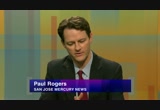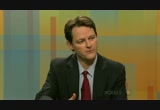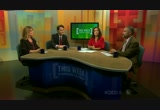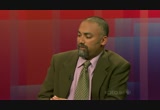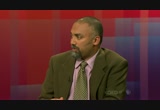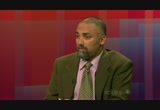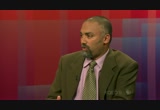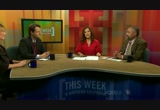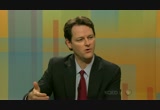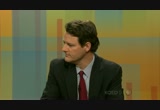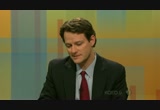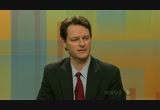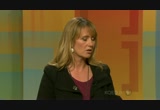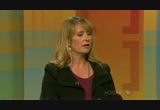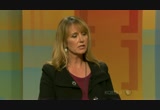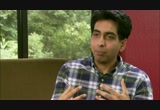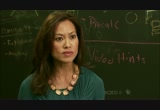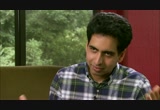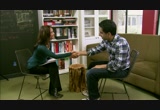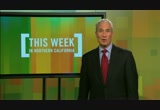tv This Week in Northern California PBS December 7, 2012 7:30pm-8:00pm PST
7:30 pm
on a mission to bring a free world class education to anyone, anywhere. >> it's really about the student taking ownership of their own learning. >> coming up next. good evening. welcome to "this week in northern california." big news today from the u.s. supreme court on gay marriage. before we get to our other topics, we'll briefly discuss that with our panelists. joining me tonight are jill tucker, "san francisco chronicle" education reporter.
7:31 pm
matthai kuruvila, also with the "san francisco chronicle." and paul rogers with "san jose mercury news." the high court announced it will review proposition 8, california's ban on same-sex marriage and the federal defense of marriage act. paul, we'll begin with you. what can we infer from this? what's the time frame? can we expect any sweeping judgments? >> well, a timeframe is the arguments are going to happen in march then we expect a decision by the end of the court session which is june 27th. it will probably go right to the very end. as for how sweeping and how big of a decision we can expect, that's sort of the $64,000 question that court watchers were already speculating about today. are we going to get a narrow ruling one way or another on either one of these two cases or is it going to be one of those once in a generation social civil rights type cases like roe v. wade or brown v.s. board of education? and i think nobody knows. >> how much attention do you think they give to that, to public opinion?
7:32 pm
where the public stands on an issue? and growing sentiment? >> it's a great question. i mean, if you look at the evolving public opinion on this, there were polls in 2004 that were taken by gallup and "washington post" and other people that showed about 60% of the public opposed same-sex marria marriage. gallup had a poll out that showed 53% support and about 40% oppose. there are measures on state ballots around the country last month, and all for of them, the same-sex marriage side won. so the justices can see the trend. in that gallup poll, more than 70% of young people support same-sex marriage. the question is, do they see themselves stopping something they think is moving too fast? or do they want to make sure they're not behind the curve of history? >> well, it's clear that the people that were against gay marriage, they were happy about this today. even though it does have the potential for creating this nationwide ruling that allows gay marriage. i think we're up to how many
7:33 pm
states? about nine states and washington, d.c. so there's definitely a lot of states out there that are going to be paying attention. >> on the other hand, we have 31 states, i believe, that have a ban in place. this is going to be a very closely watched decision. closely watched situation. no decision yet until june. but, you know, we also have some other big local news as well. that was the big national news today. but in local news, the oakland police department has for the past decade been under court order to make reforms. it stems from a high-profile misconduct lawsuit involving a group of cops known as the riders. now city leaders are hoping a last-minute tentative deal will avoid a federal takeover of the department. matthai kuruvila, i know you've been covering this story. what are the details of this settlement and what does it mean for the department? >> well, what this agreement involves is an agreement between the police union, the city and professors attorneys who filed
7:34 pm
this original civil rights lawsuit. what they've decided on is creating a compliance director. now, this would be a quasi mayor of oakland in a sense in that he gets to -- he or she would have the power to fire the police chief with the court approval. they would have the power to direct the city administrators. those are two things currently only the mayor has. it's limited in scope in that it would only effect the reform tasks that are incomplete for the police department. the city had been very concerned that this potential receiver, or federal receiver, would have oversight over the entire police department. so all -- so all three sides involved in this are very happy. >> and this whole situation stems from the riders case. remind us, again, what that was. that was a police brutality case. >> yeah. there were some officers who were accused of framing suspects and in the wake of that, there
7:35 pm
was millions of dollars paid out in civil lawsuits, but also this agreement on reforms that laid out various tasks the department had to comply with. there aren't a variety of different issues, but there are things like whenever somebody is stopped, a police officer has to mark down what was the reason why they were stopped and what was the outcome? now, that seems really simple, but failure to do that very thing is one of the remaining tasks that is threatening the department. >> you know, matthai, this was interesting because it was very important in oakland. people have been watching this. you know, whether a receiver would come in and take over, it would have been unprecedented to have that happen. at the same time, what they're addressing, not to minimize civil rights issues, but it's not at the top of the list of the people in oakland where they're seeing crime rates rise and seeing fewer policemen on the streets. just to be clear, this has
7:36 pm
nothing to do with that. this isn't going to put more police on the streets or address the rising level of crime. at least directly. >> it won't directly address rising crime. that's correct. but what advocates would say is improving the relationship between the community and the police department is critical to improving crime. so overwhelmingly the communities that oakland police interact with our latino and black and trust with with those communities is not great in many neighborhoods. and so these reform efforts are critical, professors attorneys would say, to improving those relationships. at the same time, we're talking about a huge cost. the city has already budgeted $5 million to deal with costs related to the reforms. $5 million would pay for 30 more officers on the streets of oakland, where crime has risen 23%. arrests are down 44% over 3 years.
7:37 pm
>> what i'm wondering about is everyone happy with this decision? it's unprecedented for a city, a police department to agree to a court-appointed director like this. >> that's correct. nobody knows of any department in the nation where an outsider, a court will have such authority over city spending. this compliance director can spend $250,000 at a time. so, but the city is happy because the scope is limited. they're just addressing the reforms. the police union is happy because they were worried that a receiver could effect union contracts and collective bargaining. they now have a seat at the table. plaintiffs attorneys are happy because now they have an enforcer within the department who will make sure these reforms go forward. before plaintiffs attorneys would give advice. they would suggest solutions but they didn't have any way to make this happen. this gives each of the three groups a piece.
7:38 pm
>> a say in the matter. so what happens next? a hearing on thursday. >> yeah. >> with judge henderson. >> yes. >> and at that point he'll decide whether to approve the settlement or do something else? >> what city officials expect is at this hearing on thursday that that's what the judge will consider. is the settlement. >> how long to they think the receiver will be around? >> at least a year. >> at least a year. all right. matthai, thank you. we'll stay on it and be at the hearing on thursday. thank you so much. well, moving from crime to education, major plans are in the works to make california schools more green. it's all made possible by voters who passed proposition 39 last month. it's expected to generate billions of dollars. it closes a tax loophole for out of state corporations and requires that half the money be spent on improving energy efficiency in schools and public buildings. and paul rogers, what kind of improvements would be made to the schools and what would this mean to them? >> these are the kind of things
7:39 pm
that aren't particularly sexy, like when you see people hold press conferences because they put big new solar rays on school buildings and things. this is much more mundane stuff. like new insulation, double-pain windows, switches so the lights go out when you go out of the building. what's interesting, if you talk to engineers and energy experts who really study this stuff is you get a lot more bang for your buck when you spend those bucks doing energy efficiency rather than doing these big elaborate renewable projects. you know, it doesn't make sense to take a school building which is old with drafty windows and put $1 million solar ray on the top. whatever electricity you generate, you're then going to basically waste because you're leaking power out the windows. and i would just say the prop 39 is the most important ballot question on california's ballot that nobody paid attention to. it passed by 20 points. most people couldn't explain what it did. this money is putting in $2.75
7:40 pm
billion in new money over the next 5 years to retrofit school buildings. that is as much money, nearly, as the stem cell bond that we did in 2004 which was $3 billion. arnold schwarzenegger's million solar roofs which was $3 billion. nothing like it has ever been done on this scale in any state in the country. >> let me ask you this. how much of california's schools currently spending on energy costs and how much will this likely save them in the long run? >> again, it's a huge number. california schools spend more money an utility bills than any other cost other than the labor costs that they're paying teachers and other officials. and nationwide, we spend $8 billion with a "b" on utilities at public skpochools, so if youn save 28% on your pg&e bill which is easy, nationwide that is a $2 billion savings. >> that's serious money. >> that would buy 40 million new texbooks. the thing is, not only that, when you make that savings, the schools see their power bills go down, they can then spend that
7:41 pm
extra money on the schools. and so a billionaire hedge fund manager here in san francisco to put up $30 million to bankroll this is interested in the math of energy efficiency. a lot of money to engineers at stanford to study it. he believes it's a double-edged win that you save money for the schools, giving them more money, but you also reduce smog and greenhouse gases because you're burning less fossil fuel to heat or cool the schools. >> you know, i will say the schools, in talking to my sources in oakland and san francisco, for example, they are very excited about this money. don't, you know, do not misunderstand that at all. they would love to see this money flowing into their schools. i think what i'm hearing from them, though, and what the critics with were saying earlier, number one, how is the money going to get to them and what is it going to pay for? the reality is, there are competitive grants, talking about things like that. it's the legislator and the governor who gets to direct this
7:42 pm
money. it isn't just free money that the schools get. i think they're a little concerned about bickering and arguing about who gets that money, you know, how much power the union will have in directing that money. you know, can it go to training? can it go -- >> it's a ton of money, and the approval rating of the legislature is 10%. so this week, two legislators, nancy skinner from oakland, assemblywoman, and state senator kevin dalion from l.a. introduced bills on specifically how to spend the money. there are general parameters in the measure which basely says spend it retrofitting schools and other public buildings and do job training for people or all of the above, installing energy efficiency measures. so what their bills are going to do is say essentially give all the money to schools for retrofits and have one agency, the state general services administration, set up competitive grant programs. so there's 10,000 public schools in california. if you spend $500,000 per school, you can do half of all the schools in california. 5,000 schools over the next 5
7:43 pm
years. then the program sunsets so it's not a perpetual bureaucracy. now, legislature might end up wasting it all, but, you know, there's at least some checks and balances. audits and things like that. >> overall, sorry, excuse me, overall a big win. >> well, it depends. some people were opposed to this. there were a lot of folks, silicon valley leadership groups a business group, george schultz, former republican secretary of state, others who supported this. so it wasn't too partisan. it's a basic question of math. got to ask people, do you have insulation in your attic? if so, why? and it doesn't matter if you believe in global warming or r not. why do you have insulation in your attic? it's to save money. >> definitely a step forward in greening california schools. thank you. >> no question. >> okay. something else we want to talk about, an interesting study that came out. one in four young boys of color expects to fail in school by the time he reaches kindergarten. that's just one of the many troubling findings of the study by a state assembly committee. jill tucker, you've been following this.
7:44 pm
what are some of the other alarming findings in that study? >> you know, it starts with a very simple statistic, actually. that 70% of those under 25 in california identify as a person of color. so our young population is not prominently white, and yet these are the students, these are the children that are more likely to fail. so it's an economic issue for the state and it's a real problem in terms of looking at the future of our economy. but some of the other statistics when you look at that is that 55% of latino boys and 54% of african-american boys graduate on time. so you start harkening back to that 70% figure and then doing the math. one-sixth of african-american males between the ages of 16 and 25 are either out of work, out of school, or in jail. >> what are some of the reasons for that? did the study look at that? >> they did. you know, poverty is a big
7:45 pm
factor. many of these children experience huge amounts and repetitive amounts of trauma. and i can hear the viewers out there. i can hear them yelling into their tv set that it's parenting. right? it's the absent fathers, it's the absent parent in general and that -- those caring environments. but i think what this study is doing is it's really looking at what the reality is. the causes are a problem. poverty, trauma. fixing those is difficult. you have to lower crime, right? you have to get people jobs so that they get out of poverty. but what this report is looking at very specifically is a small subset of our society. young men and boys of color. specifically. and what they -- what their circumstances are, what their status is, and what it is that the legislature, communities, schools, our health system need to do to address the issues that
7:46 pm
these men and boys are facing. >> because when they suffer, it really affects all of us in terms of long-term productivity, the kinds of state services they need. local services. and we all fund that as taxpayers. i think we all have a stake. did the study talk about any possible solutions? are there any models that they cite as good examples of programs for young people? >> they cited programs across the state. many of them actually in the bay area and specifically in oakland where oakland is already addressing, especially the school system, looking at this as a holistic issue basing them. they're focusing very specifically on african-american boys and they've created the office of african-american male achievement. and they are looking at health care, trauma treatment, mentoring, manhood development classes. and they're doing everything from bringing health clinics from children's hospital into the schools to teaching these
7:47 pm
young men how to tie ties. so it is a vast system. these are the types of programs that they're trying to push either legislatively or through community programs. >> and this is a shift in how we've looked at the achievement gap. >> you know, this really is a report, because it's looking at this issue from a different perspective. we've talked about the achievement gap over and over again. this really is looking at a specific gender and to a certain degree a specific race. >> all right. jill, thank you very much for the update on that. something else we want to tell you about. a new study by the u.s. department of education paints a pretty bleak picture of california's high schools. only 76% of the state students actually graduate. that puts california at 32nd in the entire nation. pretty low. i recently met with an education pioneer who hopes to change how young people learn, a click at a time. 6 million students around the world and counting know his voice and drawing style. >> if you get two green marbles
7:48 pm
then you are going to win. >> reporter: but not everyone knows his face. sal khan is the founder of the khan academy and the man behind simple but effective video lessons about a wide range of topics, like the fiscal cliff. >> we're cutting on the order in $100 billion in government expenditures. >> reporter: khan started out teaching his cousin math over a we cam. when he posted his videos on youtube, they caught on like wildfire. khan quit his job at a hedge fund and began creating lessons in earnest from his closet. today, the khan academy boasts a full staff. universities like m.i.t. and stanford and for-profit companies like corsara and udacity have jumped into the mix with their own online classes. >> what's exciting about online learning is it's not your -- there's not a competition between the intellectual and your everyday life. they can happen at the same time. >> reporter: khan's vision, anyone can watch his videos
7:49 pm
anywhere for free at their own pace. his program, and ideas, are now being used by school districts from east palo alto to los angeles. you specialize in online lessons, so people might find it surprising that you're partnering with brick and mortar schools. why did you decide to do that? >> i have young children, and my personal -- i want them to go to a physical school. i think the physical school is a very important part of someone's education. now, when they go to that physical school, what they do, in my ideal world might be different than the schools you and i grew up in. i don't want my children to go to a school where they are all learning at the same pace. i don't want them to go to a school where they have a weakness and concept, have to be on an exam, or see on an exam when adding fractions and the whole class moves on. >> is that your criticism of the way traditional education works today that everyone is stuck in the same mode regardle lesless whether they're learning at a different pace? >> the schools you and i went
7:50 pm
to, you take a math exam and get b-plus, that's considered a good grade. that means you had gaps in your knowledge, in something foundational like adding negative numbers or multiplying fractions. then later that gap is only going to grow and grow and grow. by the time you get to algebra, you're going to have trouble doing algebra because you didn't know your prealgebra work. >> in california, where there's bad funding problems, large population of limited english speakers. how do online lessons address that? >> we've actually translated our entire library of videos into spanish, portuguese, hindi, russian, arabic. i could keep going down and down the list. we have a lot more to do to localize the site. we are seeing teachers throughout the state, throughout the country, throughout the world saying at minimum, look, here's our resource. your parents can't afford tutoring, this is free. >> you have a new book "the one world schoolhouse." you write about your vision for the future of education. can you paint that picture for
7:51 pm
us? >> have multiple teachers working together, have multiage classrooms. i imagine a classroom looking like our office here, an open inspirational space. students all have their own goals. they have mentor, teachers who can help them achieve those goals. it's the student taking ownership of their own learning. >> you're part of a growing tri trend. online universities are growing. ivy league universities are getting in on the act. universities such as harvard and m.i.t. are offering their courses, some of them online for free. of course, there's the for-profit online yustuniversit. what do you think of this trend? >> broadly speaking, the trend is a huge positive. all of these players, m.i.t., harvard, some of the things going on in stanford and other places, they're putting knowledge out there for free. core to our mission. our mission is a free world class education for anyone, anywhere. these other placers are helping us push that mission forward. and so the missing piece, the piece that will really allow the
7:52 pm
con academies or m.i.t.s of the world to really thrive is to get to a confidence-based system, if i learned algebra on con academy or learned it through apprenticeship or high school, i can prove it to the world, hey, i know algebra and the world will recognize that. >> is there a downside to the trend? that's all well and good for the online universities and big name universities, ivy league schools because they're so famous. what happens to the medium sized less prestigious middle ground universities? do they disappear? >> i think the middle will have to introspect. i think it will be very healthy. we all know what's going on right now. we are telling students of all demographics, you should go to college. that is your ticket to a real career. come out on the other side and oftentimes you might have trouble getting a job. you see that in the unemployment numbers. they're disproportionately high from new college grads and saddled with debt that can't be canceled from bankruptcy.
7:53 pm
>> does any systemized education make sense anymore? you have a lot of young people who feel inspired by college dropouts, bill gates, mark zuckerberg, steve jobs. they did pretty well. >> yes, well, for any of them who will cite those examples i would encourage them to watch the probability videos. >> very low probability of that happening to them. >> lebron james, too, and others. i, you know, those are good examples, and i would be happy if my children became internet billionaires. but that's not a career track that we can all depend on. what i think is exciting about the next five years, the next ten years, next 30 years, is there's going to be much more variety in how people can learn and how people can get credentials. in the last 100 years or 200 years there was only one way to do it. go to a four-year institution, t go to a community college, pay a lot of tuition, get a bachelor's of science, bachelor's of art. they could choose that path, they could choose that path and
7:54 pm
apprenticeship. could do just an apprenticeship. apprenticeship plus online learning. it will be up to them to decide what fits their needs best and prove it to the job market or prove it to a graduate school that they're ready for that or a potential spouse. i actually think online is going to be much more in line with actually having people learn their whole life as opposed to our current model where most people stop in their early 20s. >> online education is here to stay for a while. so is the c khan academy. thanks for joining us. >> thanks for having me. >> read more about the khan academy in sal khan's new book "the one world schoolhouse." i want to thank all of our guests for being here tonight. visit kqed.org/thisweek for archives of the show. to subscribe to the newsletter and pod cast and share your thoughts and story ideas. and in closing tonight we'd like to take just a moment to remember concord born jazz legend dave brubeck. he died wednesday morning one
7:55 pm
7:59 pm
gwen: cliff diving, in front of the cameras and behind the scenes. plus, tea party politics and the deepening crisis in syria. tonight on "washington week." the president and the speaker square off at the edge of the fiscal cliff. >> that is a bad strategy for america, it's a bad strategy for your businesses, and it is not a game that i will play. >> the president has adopted a deliberate strategy to slow walk our economy right to the edge of deliberate strategy to slow walk our economy right to the edge of the fiscal cliff.
120 Views
IN COLLECTIONS
KQED (PBS) Television Archive
Television Archive  Television Archive News Search Service
Television Archive News Search Service 
Uploaded by TV Archive on

 Live Music Archive
Live Music Archive Librivox Free Audio
Librivox Free Audio Metropolitan Museum
Metropolitan Museum Cleveland Museum of Art
Cleveland Museum of Art Internet Arcade
Internet Arcade Console Living Room
Console Living Room Books to Borrow
Books to Borrow Open Library
Open Library TV News
TV News Understanding 9/11
Understanding 9/11
